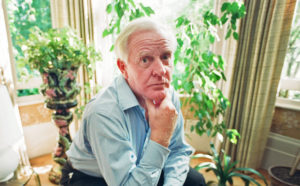When I teach the writing of fiction, I often start with a topic for discussion. The question is this: if you glimpsed a person for half a second, in passing, what would you know about him or her? If you spent a minute with them? Or an hour’s conversation, what more would you learn? Or a full day?
The point is to get students to reflect on what is often immediately apparent about a person — such as sex, age, physical build, race — and what emerges with longer acquaintanceship. Students may bring up things like accents, levels of education or cultural knowledge — but almost always a little nervously, as if not quite sure if these are legitimate objects of interest. I’ve never had a student spontaneously suggest that one thing you might notice is somebody’s social class, and embarrassment always comes from my suggesting it. These days, it’s just not what the novelist should be thinking about.
Douglas Stuart’s debut novel Shuggie Bain, for instance — a coming-of-age story set in working-class Glasgow — was sufficiently out of fashion to lead 30 publishers to reject the manuscript. After its eventual release, it became a huge triumph. This week, Stuart publishes another novel set in the same world.
Young Mungo follows a boy whose mother is a hopeless alcoholic on the breadline; his elder brother is a thuggish criminal, living with his underage girlfriend and their baby. But his sister, Jodie, is intelligent, orderly, practical, full of possibilities: “She’s gonnae be a doctor, or an astronaut.” Mungo has ambitions, too, although he has never been outside the East End of Glasgow. He falls in love with Jamie, and together they dream of escape. But it’s not a geographical escape; there’s no doubt that it’s their social class they need to leave.
Such frank investment in social improvement now seems unusual in a novel. Stuart knows better; in an interview he has remarked that the one positive consequence of the urban deprivation he observes is that it gave rise to masterpieces of the written word. But few novelists would be brave enough to write of Jodie’s future as a place where she “would round out her vowels and suppress her glottal stop; she would like her bread to be brown and her films to be foreign”. The urge to better oneself through education is not something novelists want to be seen praising. After all, it might look as if you thought some people were better than others, and even that some of the people left behind, like Mungo, who “would work where he could, and he would steal what he could,” might bear some responsibility for their own lives. If you’ve invented all of these cases, the misbehaviour starts to look fairly terrible to the contemporary eye. And so the subject of social advancement has largely been left to the memoirists, who can at least show that they are writing the truth, or at least “their” truth.
But social class — how people may be trapped in their circumstances, and struggle to escape them — has been at the core of the novel since the beginning. The form thrives on the differences between people, and the place people take in the world. They can be as vast as between Dickens’s Lady Dedlock and Jo the crossing sweeper, or as minute, but real, as those between Austen’s Emma and her vulgar enemy Mrs Elton. But we have to be able to tell characters apart for the novel to make sense; a story set in a society where social differences had been genuinely erased might be quite hard to follow.
Novels, too, are dynamic forms. They tell of changes in circumstances, and how characters end up in places they could not foresee. Very often, these journeys are social odysseys. Defoe’s Moll Flanders, rampaging through rich merchants and bankers as husbands before ending up as a common thief, starts it off. Proust’s Madame Verdurin, starting in obscure circumstances and ending as the Princesse de Guermantes, is an almost indecently frank example; Elizabeth Taylor’s Angelica Deverell shows that the habit of rising in society is not forbidden to artists and writers. All in all, it is not just class that has always driven the novel, but how it changes.
But now, through a combination of nervousness, embarrassment, and an apparent concern by novelists that their observations on difference shouldn’t be mistaken for snobbishness, the subject is being cast aside. In part, I think, this is because social class seems much more complex and puzzling than it used to be. What to make of a Russian oligarch with his house in Belgrave Square? Or the Syrian professor and refugee, now driving an Uber to get by?
In part, too, it must be affected by a general squeamishness about making personal observations of a specific sort. Some readers have started to object when a novelist makes a factual note about a character’s physical nature, or their race. This style of objection might be making novelists nervous about plain statements of class. You can talk about a character’s wealth or poverty, but it is quite hard to imagine a serious novelist writing about a character’s relationship to money and status in the direct and contemptuous way Evelyn Waugh writes about John Beaver, or Rex Mottram.
What we call class is a complex but coherent association of culture, power, money, behaviour, speech and — more now than 50 years ago — education. It’s a compelling subject, but, strikingly, we seem only to be comfortable with it in fiction in the safely removed form of the historical novel or novels of different cultures: the Indian novel in English still talks bluntly about social status. Novelists who made their mark with exquisitely differentiated fiction about class, such as Martin Amis or William Trevor, are markedly dropping out of fashion.
What is taking the place of this traditionally central concern? The main interests of the novel now are such things as race, particularly racial injustice, sex and sexual preference, and (a surprisingly common interest) the world as seen by individuals who are somehow hindered by an external factor, such as a mental illness. Indeed, perhaps Stuart gets away with his analysis of class because both his novels are also concerned with one of these external factors, gay male sexuality. These factors will successfully distinguish characters; they will do a good job of showing how an individual is treated by society. They are all important and interesting subjects. But as motors of fiction they have one marked limitation — they are all unchangeable characteristics.
In Great Expectations, Pip’s story of transforming himself into a gentleman powerfully drives the narrative through a minute attention to a shifting social standing. It’s hard to imagine how a novel focused on these other fictional concerns — even if it could reveal how essential and insurmountable differences between people often become apparent through crushing injustice — could reproduce such a journey.
Perhaps there is a larger pressure at work here, about a sort of social media-driven desire on the novelist to present themselves in as amiable a light as possible. A novelist who writes with their full attention on racial status in a post-imperial society is obviously commendably engaged; a novelist who writes about the different styles of speech of rich and poor is running the risk of being labelled the worst of men, a rampant snob. It might be easier to suppress those observations altogether, however conspicuous and interesting they are.
I walk my dog most mornings in Battersea Park. There, a huge range of society mixes; young professionals, retired working class families, those in social housing, and the seriously rich of Chelsea. You would have to be unusually slow not to register the dramatic differences between some of these people, and how they manifest themselves in behaviour, speech, the names of dogs, even the dogs themselves (Labradors and French bulldogs called Reggie are upper middle class; Alsatians and Staffordshire bull terriers called Killer or Sheba, probably working class). This is the sort of thing that novelists used to be very interested in. Now, it seems to me that there is a disinclination to talk about what is as plain as a pikestaff, because what sort of writer would even try to deduce anything from an Alsatian being called Sheba?
For this reason, Young Mungo, an excellent novel, nevertheless feels somewhat old-fashioned. But it’s very good to see a novelist entering with some of the old gusto into working class culture, exploring how its products might inhabit it, or want to get out of it at the first opportunity. Stuart is rare among contemporary novelists in saying, without the slightest apology, things like: “Clothes are often a signal for social class.” And so they are: and yet we are not expected to notice it, or remark upon it. What this sort of thing is starting to require is real nerve.
Disclaimer
Some of the posts we share are controversial and we do not necessarily agree with them in the whole extend. Sometimes we agree with the content or part of it but we do not agree with the narration or language. Nevertheless we find them somehow interesting, valuable and/or informative or we share them, because we strongly believe in freedom of speech, free press and journalism. We strongly encourage you to have a critical approach to all the content, do your own research and analysis to build your own opinion.
We would be glad to have your feedback.
Source: UnHerd Read the original article here: https://unherd.com




